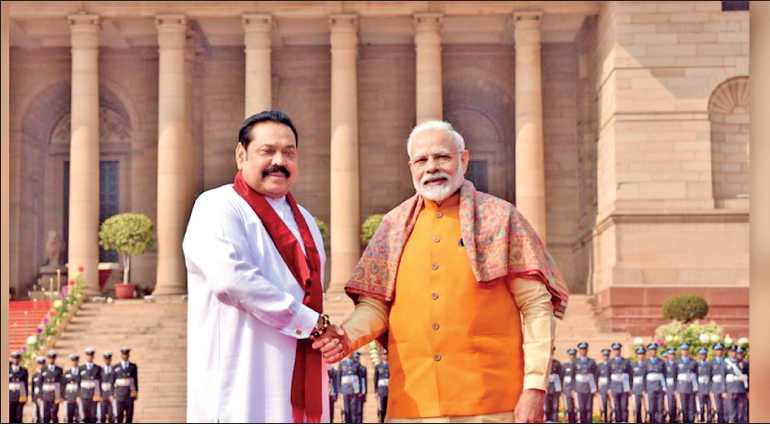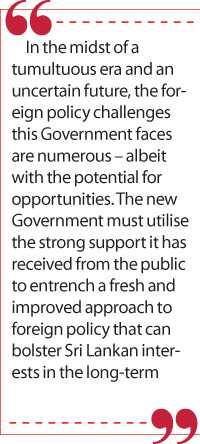Monday Feb 16, 2026
Monday Feb 16, 2026
Thursday, 27 August 2020 00:00 - - {{hitsCtrl.values.hits}}

With the President’s first foreign trip being to the neighbouring State and Prime Minister Modi being the first to congratulate the Prime Minister, coupled with several key public statements and symbolic actions – it is clear that relations have drastically improved
The results of the recent elections have demonstrated an undeniable shift in the political landscape of Sri Lanka. The clear mandate that the current Government has received, along with its two-thirds majority, allows for a fresh look at the future of the country’s foreign relations. 
Under the Yahapalanaya regime, the competing interests of the national Government resulted in a foreign policy that was extempore, confused and lacked direction. The potential for the current President and Prime Minister to work together provides a far better foundation for establishing a cohesive foreign policy framework for the nation to effectively engage with major global powers and key regional players.
One of the key trials for the new Government will be to navigate the recovery process in the post-COVID era and likely global economic downturn.
Impact of COVID
History has shown the drastic changes in society that can result from pandemics. A tiny virus has the ability to expose weaknesses in our systems and alter the course of history. In the 5th century BCE, the powerful major commercial and naval superpower of Athens in Ancient Greece was ravaged by a plague during the Peloponnesian War with Sparta, contributing to its eventual defeat.
Athens never managed to recover its former premier position and power. The Mayan and Incan civilisations were nearly wiped out by epidemics of smallpox and the devastating effect on the Aztec Empire paved the way for Europeans to colonise the Americas.
Disease can shape human history
The global effect of the coronavirus has been economically disastrous, with many predicting the worst global downturn since the Great Depression. Volatile stock indices, rising unemployment and the breakdown of global supply chains paint a stark picture for the difficult period ahead. In this context, managing Sri Lanka’s economic recovery and facing the challenges of a global downturn will undoubtedly be a priority for the new Government.
A clear foreign policy will be vital to combat these challenges. The global economic troubles, severe impact to the tourism industry from the double whammy of the Easter attacks and COVID – and substantial foreign debt repayments of around $ 55 billion, mean that Sri Lanka cannot afford to neglect its strategic international interests.
It is impossible to predict which countries/regions will be most resilient and wide-ranging cooperation will be imperative to the success of Sri Lanka’s recovery. The nation must leverage what it can as a small State in a strategic location and strengthen its relations with all key powers without tying its fate to one side.
Relations with the major powers
Whilst previous relations between India and the Rajapaksas had decidedly cooled, there has been a clear and concerted effort by both sides to bolster the relationship. With the President’s first foreign trip being to the neighbouring State and Prime Minister Modi being the first to congratulate the Prime Minister, coupled with several key public statements and symbolic actions – it is clear that relations have drastically improved.
Both countries have demonstrated a keen intention to build on this. India has extended its symbolic gestures by providing assistance to Sri Lanka in the form of medical supplies and a $ 400 million currency swap facility.
However, India’s concerns about Chinese influence in Sri Lanka will persist and must be assuaged. Whilst India struggles to match China’s ability to invest in infrastructure projects, regional and security considerations guarantee that strong relations are paramount.
The rise of extremism and the renewed focus of ISIS in South Asia are a joint concern for both nations. The failure of the Yahapalanaya Government to heed the warnings provided by Indian Intelligence before the Easter bombings are a stark reminder of why cooperation on this front is so vital.
The pandemic has deepened already simmering major power rivalries, with the US and China grappling for global influence. Whilst China suffered a setback in its initial response, it now attempts to fill the lacuna stemming from a perceived lack of leadership by the US.
China is now pushing for leadership in global health by doubling down on its ‘health silk road’, provision of medical aid/supplies and economic support (such as a $ 500 million concessionary loan to Sri Lanka).
Whilst the US vexed its allies with aggressive bidding for medical supplies and European travel restrictions without advanced notice – China in contrast has extended its soft power initiatives to European countries. Chinese aid and supplies have been received in Serbia with great gratitude by the Serbian President, as well as in Italy – a country particularly affected by the pandemic and harbouring significant Eurosceptic sentiment.
As tensions between China and the US increase, Sri Lanka will inevitably come under greater scrutiny. For the US, their apprehensions of Chinese influence in Sri Lanka (and its geostrategic importance) will undoubtedly impact any of their foreign policy decisions in relation to this region.
With indications of US-China financial decoupling post-pandemic, the economy that recovers faster out of these two countries will receive a significant boost in influence as struggling smaller countries look for trade opportunities. 
It would be disadvantageous in the long-term for Sri Lanka to focus its efforts on one major power whilst allowing relations with the US to further decline. China is viewed as a much more attractive partner due to their longstanding support of Sri Lanka during its difficult times and their loans coming with less strings attached – however, it would be counterproductive for Sri Lanka to rely exclusively on Chinese assistance at the expense of other major powers.
The US’ global influence is undeniable and any holistic foreign policy must be able to astutely balance the competing interests of the major powers in a way which benefits the nation.
Sri Lanka’s public relations, particularly with the Western countries, have taken significant damage in the recent past. A series of foreign policy mistakes, as well as a tendency for myopic and extemporaneous reactions have led to much lost ground on this front warranting urgent rectification.
However, it could be argued that these countries have also made mistakes in their handling of their own public relations within Sri Lanka. Whilst some sections of society are suspicious of becoming too beholden to the Chinese, the general perception in the country is that they are less likely to interfere in domestic affairs.
This is at odds with how the Western nations are perceived. Not only are they seen to be particularly favourable to certain political parties and groups, they are also seen as decidedly hostile to others whilst engaging in efforts to influence domestic policies and subvert sovereignty. It is inevitable that this ends up inimical to their long-term strategic interests as the build-up of negative public sentiment diminishes the ability to engage in constructive bilateral engagement.
One only has to look at how allegations of connections to Moscow and Russian attempts to influence elections are used as political attacking points in countries like the US to wonder how they failed to recognise the implications of their own actions.
If the US is serious about cooperating with Sri Lanka, they will have to compromise and rebuild trust. If they want to improve human rights and the rule of law in Sri Lanka, this could be done by working with the Government and providing assistance for strengthening institutions.
However, the idea of prosecuting alleged war crimes based on tenuous evidence and judging war heroes through international mechanisms is deeply unpopular in Sri Lanka, and very likely to drive the country towards other major powers.
Few Sri Lankans would be convinced of the authenticity of their concerns considering how some particularly egregious human rights violating countries are tolerated (and actively courted) when convenient. Their divisive approach to Sri Lanka has failed and must be replaced with genuine cooperation with this Government that has received an overwhelming mandate by the people.
There is much room for cooperation based on a confluence of interests in the future and it is up to both parties to secure it.
A vision for the future?
In the midst of a tumultuous era and an uncertain future, the foreign policy challenges this Government faces are numerous – albeit with the potential for opportunities. The new Government must utilise the strong support it has received from the public to entrench a fresh and improved approach to foreign policy that can bolster Sri Lankan interests in the long-term. The foreign service must be professionalised, and the contributions of professionals and academia will be invaluable in shaping policy in a way that reinvigorates the nation’s potential. As we gaze towards the future, our global relations must be based on a sense of purpose, clarity and consistency to meet the challenges ahead.
(The writer is a Barrister-at-Law (England and Wales) and a researcher in international law at the University of Durham.)